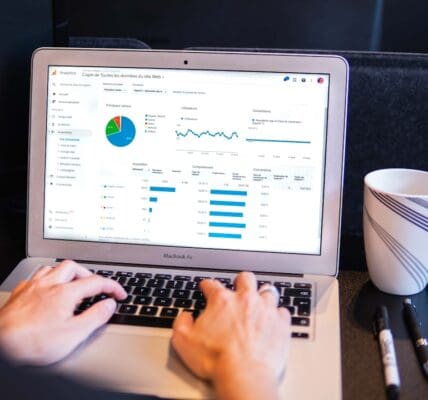Local PPC (pay-per-click) advertising is an essential component of local business marketing strategies. This method enables businesses to target potential customers within specific geographic areas, increasing the likelihood of converting leads into sales. Local PPC ensures that advertisements reach the intended audience at optimal times, resulting in higher conversion rates and improved return on investment.
A primary advantage of local PPC is its ability to target consumers actively searching for products or services in their local area. This allows businesses to reach potential customers at the moment they are ready to make a purchase, enhancing the probability of converting leads into sales. Furthermore, local PPC enables smaller businesses to compete more effectively with larger national brands by focusing on specific geographic areas without competing for broader, more generic keywords.
Local PPC is crucial for businesses aiming to enhance their online visibility and increase foot traffic to physical locations. By targeting local consumers with relevant advertisements and offers, businesses can improve brand awareness, drive website traffic, and ultimately boost sales and revenue.
Key Takeaways
- Local PPC is important for businesses to target specific geographic areas and reach potential customers in those locations.
- Targeting local keywords and creating ad copy that speaks to the local audience can improve the effectiveness of local PPC campaigns.
- Utilizing location extensions and ad customizers can help businesses tailor their ads to specific locations and increase relevance to local searchers.
- Leveraging Google My Business is crucial for local PPC as it allows businesses to manage their online presence and appear in local search results.
- Creating local landing pages and call-to-actions can help businesses drive conversions from local PPC traffic and provide a personalized experience for local visitors.
- Monitoring and analyzing local PPC campaigns is essential for optimizing performance and making data-driven decisions to improve results.
- Engaging with the local community through PPC can help businesses build relationships, increase brand awareness, and drive local customer engagement.
Targeting Local Keywords and Ad Copy
Targeting Local Keywords
When it comes to local PPC, targeting local keywords that are relevant to the business’s products or services and geographic area is crucial. This can include keywords such as “best pizza in [city]” or “plumber near me,” which are specific to the local area and indicate that the user is actively seeking a product or service.
Creating Compelling Ad Copy
In addition to targeting local keywords, creating ad copy that speaks directly to the local audience is vital. This can include mentioning the business’s specific location, highlighting any local promotions or events, and using language that resonates with the local community. By tailoring ad copy to the local audience, businesses can increase the likelihood of capturing the attention of potential customers and driving them to take action.
Maximizing Campaign Effectiveness
Overall, targeting local keywords and creating compelling ad copy is essential for maximizing the effectiveness of local PPC campaigns. By ensuring that ads are relevant to the local audience and speak directly to their needs and interests, businesses can increase click-through rates, improve ad relevance, and ultimately drive more conversions.
Utilizing Location Extensions and Ad Customizers

In order to further enhance the effectiveness of local PPC campaigns, businesses can utilize location extensions and ad customizers. Location extensions allow businesses to display their address, phone number, and a map marker alongside their ads, making it easier for potential customers to find and contact them. This is especially important for businesses with physical locations, as it can drive foot traffic and increase in-store visits.
Ad customizers, on the other hand, allow businesses to dynamically insert ad text that is tailored to the user’s search query. This can include inserting the user’s location into the ad copy, highlighting local promotions or events, and customizing ad text based on the user’s device or demographic information. By utilizing ad customizers, businesses can create more personalized and relevant ads that are more likely to resonate with the local audience.
Overall, utilizing location extensions and ad customizers can help businesses maximize the impact of their local PPC campaigns. By providing users with relevant location information and creating personalized ad experiences, businesses can increase ad visibility, drive more clicks, and ultimately improve campaign performance.
Leveraging Google My Business for Local PPC
Google My Business is a powerful tool for local businesses looking to enhance their online presence and drive more foot traffic to their physical locations. By claiming and optimizing their Google My Business listing, businesses can ensure that their information is accurate and up-to-date, making it easier for potential customers to find them online. Additionally, Google My Business allows businesses to showcase customer reviews, photos, and promotions, providing users with valuable information that can influence their purchasing decisions.
When it comes to local PPC, leveraging Google My Business is essential for maximizing campaign performance. By linking Google My Business with their PPC campaigns, businesses can ensure that their ads are being displayed alongside their Google My Business listing in search results. This can increase ad visibility and drive more clicks from users who are actively seeking products or services in the local area.
Overall, leveraging Google My Business for local PPC can help businesses increase their online visibility, drive more website traffic, and ultimately boost sales and revenue. By ensuring that their information is accurate and up-to-date and linking their listing with their PPC campaigns, businesses can maximize the impact of their local advertising efforts.
Creating Local Landing Pages and Call-to-Actions
In order to maximize the effectiveness of local PPC campaigns, businesses should create dedicated landing pages that are tailored to the local audience. This can include highlighting specific products or services that are popular in the local area, showcasing customer testimonials or reviews from local customers, and providing information about the business’s physical location and contact details. By creating local landing pages, businesses can provide users with a more personalized and relevant experience that is more likely to drive conversions.
In addition to creating local landing pages, businesses should also include strong call-to-actions (CTAs) in their ad copy and on their landing pages. This can include encouraging users to visit the business’s physical location, call for more information, or make a purchase online. By including clear and compelling CTAs, businesses can increase the likelihood of driving users to take action and ultimately convert them into customers.
Overall, creating local landing pages and including strong CTAs is essential for maximizing the effectiveness of local PPC campaigns. By providing users with a personalized experience and encouraging them to take action, businesses can increase conversion rates, drive more sales, and ultimately improve campaign performance.
Monitoring and Analyzing Local PPC Campaigns

Tracking Key Metrics for Data-Driven Decisions
Once a local PPC campaign is up and running, it’s essential to monitor and analyze its performance to make data-driven decisions and optimize for better results. This includes tracking key metrics such as click-through rates, conversion rates, cost per click, and return on ad spend. By monitoring these metrics over time, businesses can identify areas for improvement and make adjustments to their campaigns to maximize performance.
Utilizing A/B Testing for Campaign Optimization
In addition to monitoring key metrics, businesses should also utilize A/B testing to compare different ad variations and landing pages to see which ones perform best. This can include testing different ad copy, CTAs, landing page designs, and targeting options to identify what resonates most with the local audience. By analyzing the results of A/B tests, businesses can make informed decisions about how to optimize their campaigns for better results.
Maximizing Performance through Continuous Improvement
Overall, monitoring and analyzing local PPC campaigns is crucial for maximizing performance and driving better results over time. By tracking key metrics and utilizing A/B testing, businesses can identify areas for improvement and make data-driven decisions that lead to improved campaign performance.
Engaging with the Local Community through PPC
Engaging with the local community through PPC is an important aspect of building brand awareness and loyalty among potential customers. Businesses can use PPC campaigns to promote local events or sponsorships that they are involved in within the community. This not only helps build a positive brand image but also increases visibility among potential customers who may be interested in attending these events.
Another way to engage with the local community through PPC is by running targeted ads that promote community involvement or support for local causes. This could include promoting partnerships with local charities or highlighting efforts to give back to the community. By showcasing these efforts through PPC ads, businesses can build trust with potential customers who value community involvement.
Overall, engaging with the local community through PPC is a powerful way for businesses to build brand loyalty and connect with potential customers on a deeper level. By promoting community involvement and support for local causes through targeted ads, businesses can build a positive brand image and increase visibility among potential customers who value these efforts. In conclusion, local PPC is an essential component of any local business’s marketing strategy.
By targeting local keywords and creating compelling ad copy, utilizing location extensions and ad customizers, leveraging Google My Business, creating local landing pages and call-to-actions, monitoring and analyzing campaign performance, and engaging with the local community through PPC, businesses can maximize their online visibility and drive more foot traffic to their physical locations. With careful planning and execution, local PPC campaigns have the potential to significantly boost sales and revenue for businesses looking to connect with their local audience.
FAQs
What is PPC advertising for local businesses?
PPC (pay-per-click) advertising for local businesses is a digital marketing strategy that allows businesses to place ads on search engines and other platforms, and pay a fee each time their ad is clicked. This can help local businesses connect with potential customers in their community.
How does PPC advertising help local businesses connect with their community?
PPC advertising allows local businesses to target their ads to specific geographic locations, ensuring that they reach potential customers in their community. This can help businesses increase their visibility and attract local customers who are searching for their products or services.
What are the benefits of using PPC advertising for local businesses?
Some benefits of using PPC advertising for local businesses include increased visibility in local search results, the ability to target specific geographic areas, the potential to reach customers at the moment they are searching for a product or service, and the ability to track and measure the effectiveness of ad campaigns.
What are some best practices for using PPC advertising for local businesses?
Some best practices for using PPC advertising for local businesses include targeting specific geographic areas, using location-based keywords, creating compelling ad copy that speaks to the local community, and optimizing landing pages for local search.
What platforms can local businesses use for PPC advertising?
Local businesses can use platforms such as Google Ads, Bing Ads, and social media advertising platforms like Facebook and Instagram to run PPC advertising campaigns targeted at their local community.












